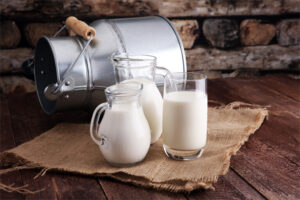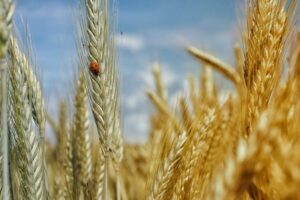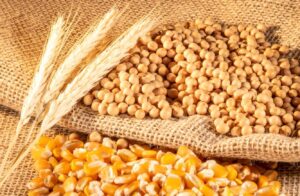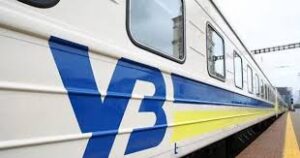
Prices for extra-virgin milk in Ukraine in January 2025 decreased by 8% to 18.5 UAH/kg compared to December 2024, according to the Union of Dairy Enterprises of Ukraine (UDEP).
Analysts noted that milk prices in January 2025 were 23% higher than in January 2024 and 33% higher than in June 2024.
At the same time, the growth rate of raw milk prices in Ukraine (in UAH) in the second half of 2014 was 2.3 times higher than in the EU (in EUR – 1.8 times). The average price in January 2025, expressed in EUR (for the domestic quality basis), amounted to almost EUR 42.7/100 kg – compared to EUR 45.7/100 kg in December 2024 and EUR 44.7 in November 2024.
“The price in EUR decreased by almost 7% compared to December 2024, and by 5.5% compared to November 2024. At the same time, the price increased by 34% compared to June 2024; by 18.5% compared to January 2024. The average price, expressed in euros and converted to the euro base, decreased to EUR47.3/100 kg in January 2024 – from almost EUR51/100 kg in December 2024,” the UMPA stated.
The experts drew attention to the fact that the ratio between the price levels in Ukraine and the EU/Poland in January 2024 was 87% to the EU average and 82.5% to the Polish average.
“The respective ratios have “rolled back” to the level of October 2024 – the competitiveness of domestic dairy products has increased in January 2025,” the industry association summarized.

Companies from the United Arab Emirates (UAE) are ready to invest in the production of processed foods, grain transshipment and port development, the Ministry of Agrarian Policy and Food has reported.
According to the ministry, during a working visit to Saudi Arabia, Minister of Agrarian Policy and Food Vitaliy Koval and a government delegation headed by First Deputy Prime Minister and Minister of Economy Yulia Svyrydenko met with more than 20 leading UAE companies. Among them are port operators, investment, agricultural and trading companies interested in import and export cooperation with Ukraine.
“Ukraine and the United Arab Emirates have opened a new page in economic partnership. Among the UAE companies there are those that are ready to enter the Ukrainian market. In particular, to invest in the production of processed products, such as oilseeds, rapeseed, soybeans. As well as grain transshipment and port infrastructure development,” Koval said.
The Minister emphasized that the Ukrainian agricultural sector is already actively working with the UAE. In 2024, we exported more than $197 million worth of agricultural products. Among the most popular products were fats and oils of animal or vegetable origin, meat and edible offal, cereals, vinegar, etc.
As reported, the Comprehensive Economic Partnership Agreement between Ukraine and the UAE was signed in Abu Dhabi on February 17. It provides for free trade between the two countries and liberalization of access to the UAE market for Ukrainian agricultural products, including duty-free supplies of beef, lamb, dairy and processed foods. In addition, the Saudi side has expressed interest in joint development of beef cattle breeding and production of organic products.

After the full-scale invasion and blocking of seaports in 2022, Ukraine began to actively use land routes for exporting agricultural products, which significantly reduced the transit of agricultural products through the EU, according to the Ukrainian Agribusiness Club (UCAB).
Analysts noted that the maximum volume exported across the borders of neighboring countries was 3.7 million tons of grains, oilseeds and their products in August 2023, when the “grain corridor” had already stopped working and Ukraine’s own sea route had not yet started working.
Experts stated that the structure of exports by country was as follows: Romania – 73% of the total exported volume (thanks to the seaport of Constanta), Poland – 14%, Hungary – 9%, Moldova – 2%, and Slovakia – 2%.
“Establishing its own export route has allowed Ukraine to reduce transit through neighboring countries. Over the past 6 months of 2024, the average monthly volume of exports through neighboring countries decreased by 3.7 times compared to the peak figure and averaged 1.0 million tons of grains, oilseeds and processed products,” the UCAB emphasized.
At the same time, in December 2024, compared to the peak, exports through the Romanian border decreased by 8.2 times to 0.3 million tons, Polish – by 1.9 times to 0.3 million tons, Hungarian – by 1.9 times to 0.2 million tons, Moldovan – by 8.9 times to 0.01 million tons and Slovak – by 12.0 times to 0.01 million tons.

In January 2025, TAS Insurance Group (Kyiv) collected UAH 525.3 million in insurance premiums, which is 47% more than in the same period in 2024.
According to the insurer’s website, motor hull insurance premiums in January 2025 amounted to 9.54% of the total, or UAH 50.12 million, which is 7.7% lower than in January 2024; motor third party liability insurance premiums – 38.45%, or UAH 201.98 million, which is 2.1 times more, and Green Card premiums – 25.84%, or UAH 135.72 million (+46.9%).
Under voluntary health insurance contracts, TAS Group collected UAH 73.54 million in premiums, which is 5.3% lower than in the same period last year and accounts for 14.5% of total premiums.
Property insurance contracts attracted UAH 8.11 million of insurance premiums, which is 22.8% less than last year.
Under other insurance contracts, the company collected UAH 55.78 million, which is 2.1 times more than in January-2024.
As reported, in January 2025, TAS Insurance Group paid UAH 202.6 million under the concluded insurance contracts, which is 26.5% higher than the amount of indemnities paid by the company for the same month in 2024.
Out of the total volume, 27.63% of payments were made on motor hull insurance (UAH 56 million), which is 37% more than in January of the previous year, 31% or UAH 62.7 million (+7.8%) on MTPL, and 24.9% on Green Card.
The share of VHI in the company’s claims portfolio in December amounted to 15.9%, or UAH 32.13 million (+28.3%).
The company paid out UAH 14.82 million under other insurance contracts.
TAS Insurance Group was registered in 1998 and is a universal company offering more than 80 types of insurance products in various types of voluntary and compulsory insurance. It has an extensive regional network: 28 regional directorates and branches and 450 sales offices throughout Ukraine

Ukrzaliznytsia (UZ) is simplifying the requirements for the company’s tender purchases by reducing the list of goods that required inspection by almost half – from 92 to 47 nomenclature items.
“The company’s board has decided to no longer apply the requirements for railway use of products in procurement and has significantly limited the list of goods subject to inspection control,” the company’s press service said in a statement on Telegram on Monday.
The list of products requiring inspection control – procedures for checking the quality and compliance of products with established standards at the stage of production – will be reduced to 47 items. Currently, the list of products approved by Ukrzaliznytsia’s order No. 44 of February 1, 2016, includes 92 items. In particular, the list includes locomotives, electric trains, passenger cars, freight cars, traction motors, auto-braking equipment, tanks, refrigerated cars, wheelsets, railroad rails, and turnouts.
The new list of products subject to production and inspection control will be published on the website of Ukrzaliznytsia. The company also said that in the coming weeks, changes will be made to the standard tender documentation and announcements with amended requirements for specific procurement items will be made.
The company noted that about a quarter of the product range purchased by Ukrzaliznytsia is labeled “railway products”, which requires it to undergo a special procedure for putting into production.
The rule made it difficult for most manufacturers and suppliers to participate in tenders and created significant corruption risks, the company emphasized, noting that reducing the requirements for participants and strengthening incoming control by Ukrzaliznytsia will simplify participation in tender procedures, increase competition in bidding and ensure the required quality, the company said.
“As promised in December at the Supplier’s Day: Railway Partnership conference, we have excluded from the list all products that are not specific to railways and do not directly affect traffic safety. This makes it much easier for many suppliers to participate in our tender procedures. In fact, for the vast majority of items, we have moved the quality control stage from the qualification of participants to the delivery stage, as we are primarily interested in the quality of the products supplied to us, not the certificates that artificially restricted competition,” the press service quoted Oleksandr Nakhod, director of Ukrzaliznytsia, as saying.
The next step will be a significant reduction in the list of products requiring a conditional number (a unique identifier assigned to railway products subject to mandatory inspection control – IF-U), Ukrzaliznytsia said.
Quotes of interbank currency market of Ukraine (UAH for 1 pln, in 01.10.2024-31.10.2024)

Source: Open4Business.com.ua